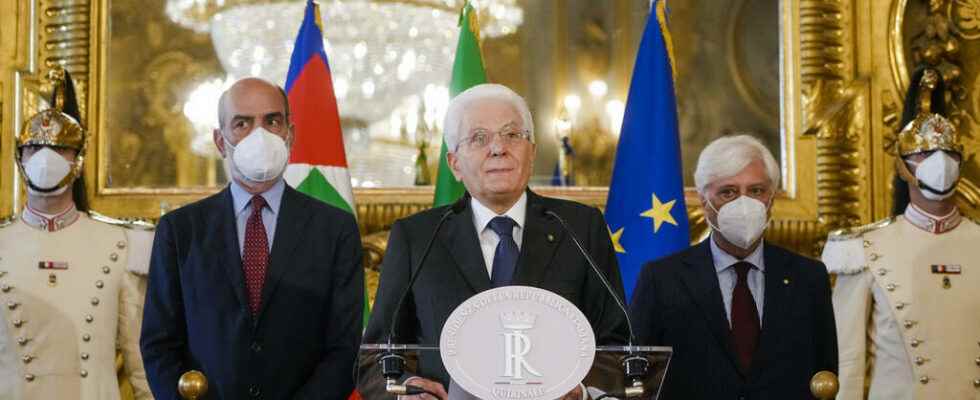Sergio Mattarella announced this Thursday the dissolution of the Senate and the Chamber of Deputies after the resignation of the President of the Council Mario Draghi, causing early elections to be held on September 25th.
“ The political situation led to this decision “said Sergio Mattarella during a televised address, in reference to the resignation of Prime Minister Mario Draghi after the defection on Thursday of three major parties from his coalition in a vote of confidence in the Senate.
“ The discussion, the vote and the modalities in which this vote was cast yesterday in the Senate » demonstrated the absence of « parliamentary support for the government and the lack of prospects for creating a new majority “, explained the Italian president. ” This condition made the premature dissolution of Parliament inevitable. “, who ” is always the last option “, he added.
According to Italian television RAI the next snap elections will take place on 25th September next. The arch-favorite in the upcoming election is the so-called “center-right” coalition, which brings together Forza Italia, Silvio Berlusconi’s right-wing party, and the far right represented by the League of populist anti-migrant tribune Matteo Salvini and Fratelli from Italy.
Fratelli d’Italia, a post-fascist party chaired by Giorgia Meloni, is given the lead in voting intentions, with nearly 24%, ahead of the Democratic Party (22%) and the League (14%), according to a poll by the SWG institute realized on July 18th. Forza Italia would collect 7.4% of the vote and the 5 Star Movement (M5S) 11.2%. With a campaign in the heart of the summer and relatively short, the balance of power should not be upset: Fratelli d’Italia should pull out of the game by coming first. ” They will go from a score of less than 5% of the votes in 2018 to 20 to 25% of the votes, according to the polls. So they are going to be the big winners. Their strategy is winning because since the 1990s, when you have been in opposition, you have regained your electoral health. They have been careful to stay in opposition since 2018 “, by not joining any coalition and remaining on the sidelines of Draghi’s national union, analyzes Christophe Bouillaud, professor of political science at the Grenoble Institute of Political Studies, specialist in Italian politics and international relations.
One round of voting
For the first time since 1948, the elections will therefore be held in the fall. They had so far always taken place between February and June, recalls our correspondent in Rome, Anne Le Nir. The electoral campaign will therefore take place in the middle of the school holidays, on the beaches, in the mountain resorts and the towns or villages of art. Another novelty: under a 2020 reform, the number of parliamentarians will be considerably reduced. The deputies will go from 630 to 400, and the senators from 315 to 200. Which suggests bitter battles.
The elections will take place in a single round with a mixed system. A majority of seats will be allocated by proportional voting and the others by uninominal voting. This system tends to favor the constitution of very heterogeneous coalitions and their victory. But as we have seen, this is not a guarantee of stability. Until then, and until further notice, the resigning government will remain in place to deal with current affairs.
The resignation of the former head of the European Central Bank had become inevitable after Forza Italia, the League and the populist formation M5S had refused to participate in a vote of confidence requested on Wednesday by the head of government in the Senate. Mario Draghi said he was ready to stay in his post only if the parties in his coalition fell into line around a government “pact”, already jeopardized last week by a first defection from the M5S. Their response was scathing.
(And with AFP)
